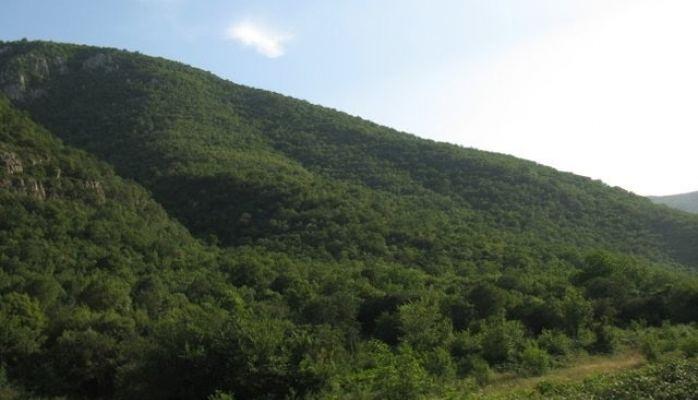Azerbaijan strongly condemns environmental terror by Armenians in Kalbajar

By Vafa Ismayilova
A senior ecology official has said that Azerbaijan strongly condemns the acts of environmental terror that are being committed by the Armenians on the territory of Kalbajar region.
“The Ministry of Ecology and Natural Resources, NGOs working in the field of nature protection, and in general, the Azerbaijani public strongly condemn the acts of environmental terror committed by Armenians on the territory of Kalbajar region,” Deputy Minister of Ecology and Natural Resources Vugar Karimov stated.
Serious environmental crimes
He described as serious environmental crimes the destruction of Azerbaijan’s flora and fauna by Armenia, especially, the felling of more than 2,000-years-old plane trees in Jabrayil, Zangilan, Gubadli, and other Azerbaijani territories liberated from the Armenian occupation, the burning of the Topkhana forest around the city of Shusha with the banned white phosphorus, and now also the felling of trees, arson attacks on forests and the intentional damage to the environment in Kalbajar.
“We again witnessed this barbarism in the photos and videos that were spread in the media outlets yesterday [15 November]. The environmental crimes committed by Armenia for many years are also evidenced by the Azercosmos satellite images. Moreover, the genocide against nature, biodiversity of the region committed by Armenia has been reflected in the preliminary results of monitoring carried out by employees of the Ministry of Ecology," he said.
International agencies informed
The deputy minister noted that the available facts had been submitted to the secretariats of the relevant international conventions. International observation and assessment teams will be invited to Azerbaijan to record these facts and assess the damage.
He also pointed out that work is already underway to restore the ecological balance in the territories liberated from the Armenian occupation.
Since November 11, seedlings of various types of trees have been planted in these territories, and measures are being taken to restore the forest cover and vegetation. This work will continue with even greater intensity, added Karimov.
To recap, no international agency has so far been observed to react to the abovementioned
At a news conference in Baku on 15 November, Azerbaijani presidential aide Hikmat Hajiyev said that “the Armenians are leaving the Azerbaijani territories, damaging the environment”.
On November 11, President Ilham Aliyev said that Azerbaijan is going to take Armenia to an international court for moral and material damages it had inflicted.
Armenians' withdrawal from Kalbajar extended
Under a trilateral declaration signed by Azerbaijani President Ilham Aliyev, Russian President Vladimir Putin and Armenian President Nikol Pashinyan on November 10, the Armenian armed forces were to completely withdraw from Kalbajar on November 15. However, Azerbaijan extended the deadline until 25 November after Yerevan conveyed its relevant request to Baku through Moscow.
The declaration envisages the de-occupation of Azerbaijan’s Aghdam and Lachin regions by December 1 as well as the return of Azerbaijani IDPs to Azerbaijan’s Nagorno-Karabakh and seven adjacent regions under the control of the United Nations High Commissioner for Refugees.
Kalbajar was among seven Azerbaijani regions around Nagorno-Karabakh that got occupied by the Armenian armed forces.
The November peace agreement ended the 30-years-old conflict between Baku and Yerevan over Azerbaijan’s Nagorno-Karabakh region that along with the seven adjacent districts came under the occupation of Armenian armed forces in the war in the early 1990s. For nearly three decades, Armenia failed to implement the UN Security Council resolutions (822, 853, 874 and 884) demanding the withdrawal of its troops, which was the main obstacle to the resolution of the conflict. The OSCE Minsk Group co-chaired by the United States, Russia and France had been mediating the Armenian-Azerbaijani conflict since the signing of the volatile cease-fire agreement in 1994. The Minsk Group’s efforts resulted in no progress as Armenia refused to abide by the UN Security Council resolutions.
Under the deal, Russian peacekeepers are deployed in the region to patrol frontlines. Turkey also takes part in the peacekeeping process. Russia and Turkey signed a deal on creating a Russian-Turkish joint ceasefire monitoring centre.
The clashes between Armenia and Azerbaijan resumed after Armenia launched large-scale attacks on Azerbaijani forces and civilians on September 27. Five Azerbaijani civilians were killed on the first day of the Armenian attacks. Ninety-three Azerbaijani civilians were killed in Armenian's indiscriminate attacks on Azerbaijani civilians. Azerbaijan launched counter-offensive operations that ended in the liberation of over 300 settlements, villages. Azerbaijan also liberated five city centres and the historic Shusha city.
--
Follow us on Twitter @AzerNewsAz
Here we are to serve you with news right now. It does not cost much, but worth your attention.
Choose to support open, independent, quality journalism and subscribe on a monthly basis.
By subscribing to our online newspaper, you can have full digital access to all news, analysis, and much more.
You can also follow AzerNEWS on Twitter @AzerNewsAz or Facebook @AzerNewsNewspaper
Thank you!
